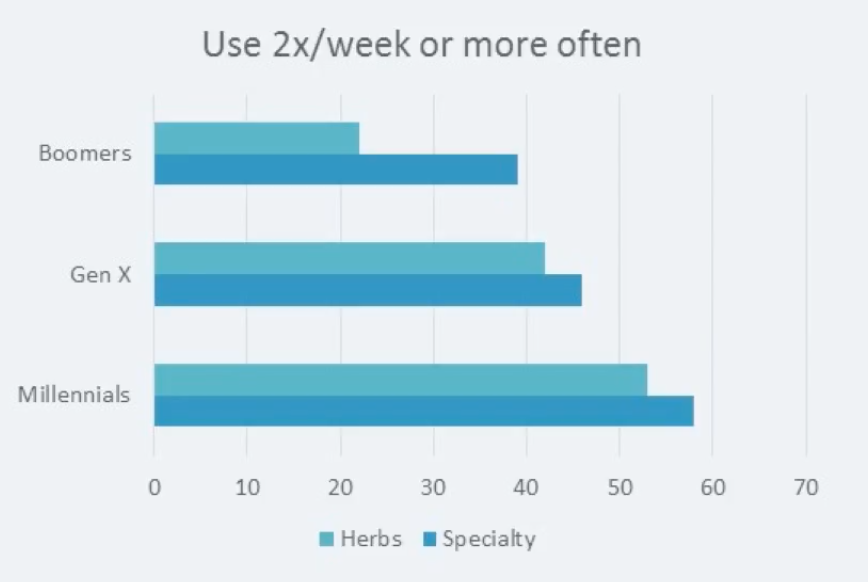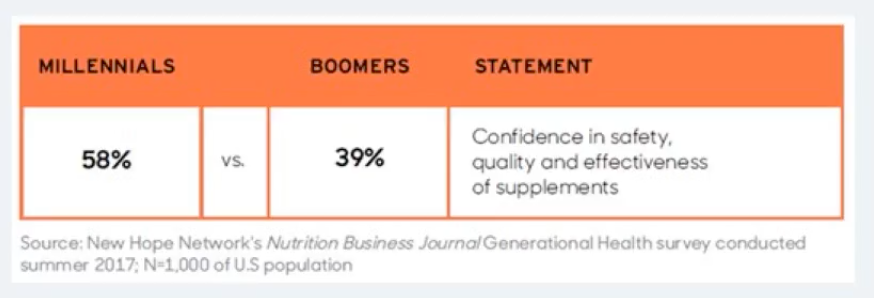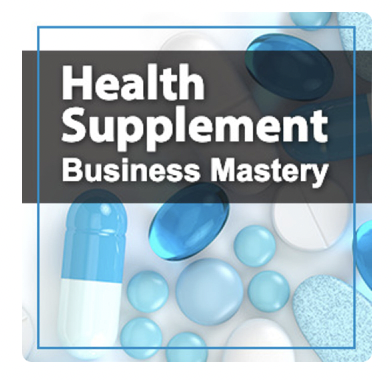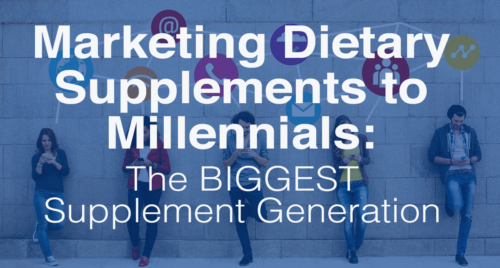Millennials… the generation raised on Flintstones vitamins, who never actually watched the cartoon, are now adults. Are taking more supplements than Generation X and Boomers.
According to the Hartman Group’s recent research, 45% of millennials (aged 18, or 20 – 35) take supplements on a regular basis. That’s at least 50 million supplement buyers in the millennial market alone.

But what’s the best way to sell to the millennial market?
The crux of selling dietary supplements online comes down to the buying forces framework we use to optimize each of our supplement clients. One of those forces in particular could be part of the reason why millennials are taking more supplements than other generations. Namely the buying force of trust.

Additionally, according to a New Hope Network consumer survey focusing on supplement use conducted in early 2016, millennials were considerably more likely than baby boomers to trust supplements (44% compared to 21% for boomers).

The future of selling dietary supplement, functional food, and personal care online is going to be greatly impacted by millennials going forward.
The first reason dietary supplement marketers should care is partly because of their buying potential.
Millennials spending power will exceed $1 trillion dollars by 2020.
The second reason is because of their lifestyle.
According to the same survey, 53% of millennials are committed to organic foods and products. This implies a more health conscious millennial buyer across the functional food market and other health related products.

However, what works to sell dietary supplements to boomers online is not what works for selling to millennials.
Millennials Don’t Respond to Old-school Direct Marketing Methods
With millennials they are not just buying as much entering into a relationship. Therefore, being 100% authentic and transparent is vital to a longterm engagement and selling to them.
Being authentic and transparent goes far beyond just your ingredients.
You need to tell your company’s story…
Empower your employees to also be authentic and transparent.
If your employees and customers are not expressing their love for your product with selfies and social media, you’re not being as genuine as you can be.
Millennials are buying into the culture more than the product.
Climb The Millennial Marketing Ladder
When selling supplements to millennials it pays to focus more on them rather than the product.
This is part of the shift from the old way of selling supplements to the new way that is currently happening online.
Authority is becoming ever more important in selling supplements to millennials. The heavy lifting of converting a sale is shifting towards building trust gradually through the ladder of influence.
The progression goes from a celebrity endorsement at the very bottom rung > to specialist > to expert is the new way of marketing to millennials.
Clean Up Your Ingredients
With millennials, “proprietary blends” lead to mis-trust. They want to know exactly how much of each ingredient is included.
But it goes even further than that…
“Clean” minimally processed and “natural” ingredients are a trend that is popular with millennials. It’s not just important to show what’s inside the bottle with your nutrition facts label.
Millennials want to know where each ingredient was sourced from and what the environmental and social impact of that sourcing was.
It’s just as important to them to know how it was made as what it was made with. Millennials place more value on knowing where and how supplements are produced and manufactured. This needs to be part of your story and ties back to transparency when selling to millennials.
Mass-Personalization
The days of “one bottle fits most” are coming to an end. Custom solutions based on your individual and specific DNA markers are the future of dietary supplements.
There are already a few companies doing this already like DynamicDNALabs.com, TakeCareOf.com and VitaminPacks.com.
As manufacturing costs continue to decrease, this option will become more prevalent of a solution to market.
Services like “23 And Me” and “Ancestry DNA” are making this type of thinking more prevalent. Right now the mainstream sees these DNA identifying services, as just a glorified family tree and a novelty.
But the true value is in the knowledge of your specific genetic traits and DNA snips that reveal personal wellness on a much deeper level. Sites like MTHFR Support and the rise of the Functional Medicine and the Nutrigenomics field are connecting the dots between the two, which makes this possible.
This type of custom supplement solution makes sense not only to millennials but to anyone who takes their health seriously.
Millennials Will Outnumber Baby Boomers
Millennials are on the cusp of surpassing Baby Boomers as the nation’s largest adult generation of consumers, according to population projections from the U.S. Census Bureau.
Millennials are projected to outnumber Boomers by 2019. Their will be 73 million millennials as Boomers start the decline, slipping to 72 million.
2019 will be the start of the shift to the new way of selling dietary supplements online.
Online traffic sources are already pushing away from the old model of sensational big bold claims. The days of benefits on top of click bait headlines, fake news will be coming to an end and more towards offer driven front ends, perhaps leaving the sensational stuff for the back end for a while before the industry cleans up itself as a consequence of the changing buyer preferences driven by the millennial market.
Discover the 3 funnels that can help your health supplement business succeed.

Listen to the Health Supplement Business Mastery Podcast for for dietary supplement entrepreneurs and marketers.




